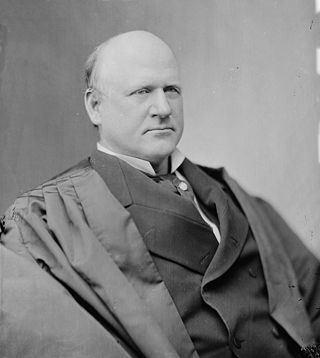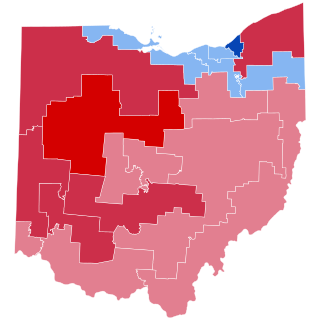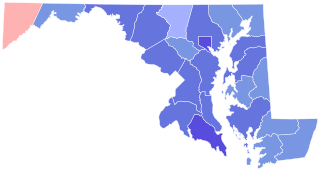
John Marshall Harlan was an American lawyer and politician who served as an associate justice of the Supreme Court of the United States from 1877 until his death in 1911. He is often called "The Great Dissenter" due to his many dissents in cases that restricted civil liberties, including the Civil Rights Cases, Plessy v. Ferguson, and Giles v. Harris. Many of Harlan's views expressed in his notable dissents would become the official view of the Supreme Court starting from the 1950s Warren Court and onward.

James Bennett McCreary was an American lawyer and politician from Kentucky. He represented the state in both houses of the U.S. Congress and served as its 27th and 37th governor. Shortly after graduating from law school, he was commissioned as the only major in the 11th Kentucky Cavalry, serving under Confederate Brigadier General John Hunt Morgan during the American Civil War. He returned to his legal practice after the war. In 1869, he was elected to the Kentucky House of Representatives where he served until 1875; he was twice chosen Speaker of the House. At their 1875 nominating convention, state Democrats chose McCreary as their nominee for governor, and he won an easy victory over Republican John Marshall Harlan. With the state still feeling the effects of the Panic of 1873, most of McCreary's actions as governor were aimed at easing the plight of the state's poor farmers.

Augustus Everett Willson was an American politician and the 36th Governor of Kentucky. Orphaned at the age of twelve, Willson went to live with relatives in New England. This move exposed him to such authors as Ralph Waldo Emerson, Henry Wadsworth Longfellow, Oliver Wendell Holmes, and James Russell Lowell, who were associates of his older brother, poet Forceythe Willson. He was also afforded the opportunity to attend Harvard University, where he earned an A.B. in 1869 and an A.M. in 1872. After graduation, he secured a position at the law firm of future Supreme Court justice John Marshall Harlan. Willson and Harlan became lifelong friends, and Willson's association with Harlan deepened his support of the Republican Party.

The United States House of Representative elections of 2008 in North Carolina were held on November 4, 2008, as part of the biennial election to the United States House of Representatives. All thirteen seats in North Carolina, and 435 nationwide, were elected to the 111th United States Congress. The party primary elections were held on May 6, 2008.

The 2008 congressional elections in Georgia were held on November 4, 2008, to determine who would represent the state of Georgia in the United States House of Representatives, coinciding with the presidential and senatorial elections. Representatives are elected for two-year terms; those elected will serve in the 111th Congress from January 3, 2009, until January 3, 2011.

The 2010 congressional elections in Ohio were held on November 2, 2010. Ohio had eighteen seats in the United States House of Representatives, and all eighteen incumbent Representatives were seeking re-election in 2010. The elections were held on the same day as many other Ohio elections, and the same day as House of Representatives elections in other states.

The 2010 congressional elections in Pennsylvania were held on November 2, 2010. Pennsylvania had nineteen seats in the United States House of Representatives. The election was held on the same day as many other PA elections, and the same day as House of Representatives elections in other states. Party primary elections were held May 18, 2010.

The 1895 New Jersey gubernatorial election was held on November 5, 1895. Republican nominee John W. Griggs defeated Democratic nominee Alexander T. McGill with 52.28% of the vote.

In the Chicago mayoral election of 1897, Democratic nominee Carter Harrison Jr. was elected, winning a majority of the vote and defeating independent Republican John Maynard Harlan, Republican nominee Nathaniel C. Sears, independent Democrat Washington Hesing, as well as several minor candidates. Harrison carried a 26.7 point lead over second-place finisher Harlan, a margin greater than Harlan's vote share itself.

The 1970 Maryland gubernatorial election was held on November 3, 1970. Incumbent Democrat Marvin Mandel defeated Republican nominee Charles Stanley Blair with 65.73% of the vote. This election was the first of eight consecutive Democratic gubernatorial victories in Maryland, a streak not broken until the election of Republican Bob Ehrlich in 2002.

The 1911 Kentucky gubernatorial election was held on November 7, 1911. Democratic nominee James B. McCreary defeated Republican nominee Edward C. O'Rear with 52.01% of the vote.

The 1942 Rhode Island gubernatorial election was held on November 3, 1942. Incumbent Democrat J. Howard McGrath defeated Republican nominee James O. McManus with 58.54% of the vote.

The 1903 Kentucky gubernatorial election was held on November 3, 1903. The incumbent Democratic governor, J. C. W. Beckham, defeated Republican nominee Morris B. Belknap to a win a term in his own right.

John Maynard Harlan (1864–1934) was an American lawyer and politician who served as a member of the Chicago City Council. Harlan, multiple times, ran for the mayoralty of Chicago.

The 1924 Iowa gubernatorial election was held on November 4, 1924. Republican nominee John Hammill defeated Democratic nominee James C. Murtagh with 72.72% of the vote.

The 1900 Rhode Island gubernatorial election was held on April 4, 1900. Republican nominee William Gregory defeated Democratic nominee Nathan W. Littlefield with 54.33% of the vote.

The 1874 Kansas gubernatorial election was held on November 3, 1874. Incumbent Republican Thomas A. Osborn defeated Democratic nominee James C. Cusey with 56.41% of the vote.

The 1920 Indiana gubernatorial election was held on November 2, 1920. Republican nominee Warren T. McCray defeated Democratic nominee Carleton B. McCulloch with 54.63% of the vote.

The 1871 Kentucky gubernatorial election was held on August 7, 1871. Incumbent Democrat Preston Leslie defeated Republican nominee John Marshall Harlan with 58.61% of the vote.

The 1898 Tennessee gubernatorial election was held on November 8, 1898. Incumbent Democratic governor Robert Love Taylor did not seek re-election. Democratic nominee Benton McMillin defeated Republican nominee James Alexander Fowler with 57.92% of the vote.






















